Introduction to Dengue and Its Impact in Delhi
Dengue fever is not just another seasonal illness—it has become one of the most significant public health concerns in Delhi over the past two decades. Each year, especially during the monsoon and post-monsoon months, thousands of people in the capital city are affected by this mosquito-borne disease. Dengue fever spreads through the bite of the Aedes aegypti mosquito, which thrives in stagnant water and urban environments like Delhi.
Delhi’s urban density, erratic water storage practices, and frequent waterlogging during the rainy season create a perfect breeding ground for these mosquitoes. That’s why the city often reports a surge in dengue cases between July and November.
The real challenge lies in timely detection. Dengue fever symptoms often mimic those of other viral infections like flu, malaria, or even COVID-19, making it tricky to identify without proper testing. A delay in diagnosis can lead to severe complications such as dengue hemorrhagic fever or dengue shock syndrome. This makes the availability of a reliable dengue test near me in Delhi a necessity rather than a choice.
Why Delhi is Prone to Dengue Outbreaks
Delhi’s climate, especially during monsoon season, creates favorable conditions for mosquito breeding. Frequent waterlogging in low-lying areas, uncovered containers in households, and poor waste management contribute to a surge in mosquito populations.
Another factor is rapid urbanization. Construction sites, abandoned plots, and poorly maintained drains serve as hotspots for mosquito breeding. Even small collections of water in flowerpots or coolers can become breeding grounds.
With millions of people traveling daily across the city, the spread of dengue becomes harder to control. One infected mosquito can quickly multiply the problem in densely populated areas.
Importance of Early Diagnosis
The earlier dengue is detected, the better the chances of recovery. When you search for a “dengue test near me in Delhi”, you’re taking the first and most important step toward protecting your health. Quick diagnosis helps:
- Confirm whether fever is due to dengue or another illness
- Monitor platelet count and prevent sudden drops
- Initiate proper medical care before complications develop
Delhi’s healthcare system urges citizens to get tested at the first sign of dengue-like symptoms. A timely dengue test can be the difference between a smooth recovery and a life-threatening situation.
Understanding Dengue Fever
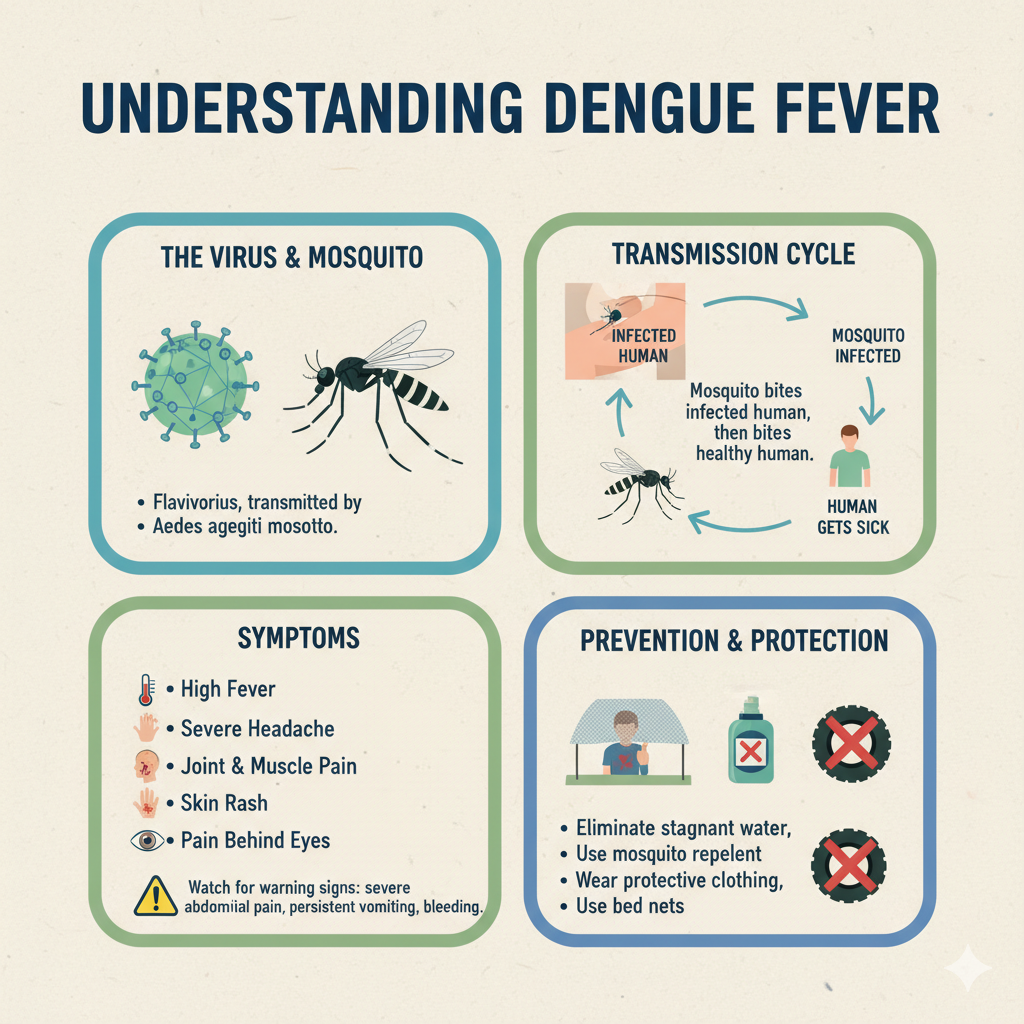
What is Dengue Fever?
Dengue fever is a viral infection transmitted through the bite of female Aedes mosquitoes. It is often called “breakbone fever” because of the severe joint and muscle pain it causes. While it can affect anyone, children, elderly individuals, and those with weak immunity are at higher risk.
In most cases, dengue fever presents as high fever, body aches, headaches, nausea, and skin rashes. However, in severe cases, it may lead to bleeding, liver damage, and shock, which can be fatal if left untreated.
Causes and Transmission of Dengue Virus
The dengue virus is spread exclusively through mosquito bites and not by direct human-to-human contact. Once a mosquito bites an infected person, it becomes a carrier of the virus. When the same mosquito bites another person, the infection spreads.
The mosquitoes that carry dengue usually bite during the daytime, especially early mornings and late afternoons. This makes prevention tricky, as people often do not take mosquito protection seriously during daylight hours.
Different Strains of Dengue Virus
There are four strains of the dengue virus: DEN-1, DEN-2, DEN-3, and DEN-4. An individual can get infected by each strain separately. Unfortunately, infection with one strain does not provide immunity against others. In fact, secondary infections with a different strain are more likely to cause severe dengue complications.
This is why experts emphasize the importance of timely dengue tests in Delhi, especially when recurrent outbreaks hit the city. Identifying the strain early helps doctors manage patients better and reduce fatality risks.
Dengue Symptoms You Should Never Ignore
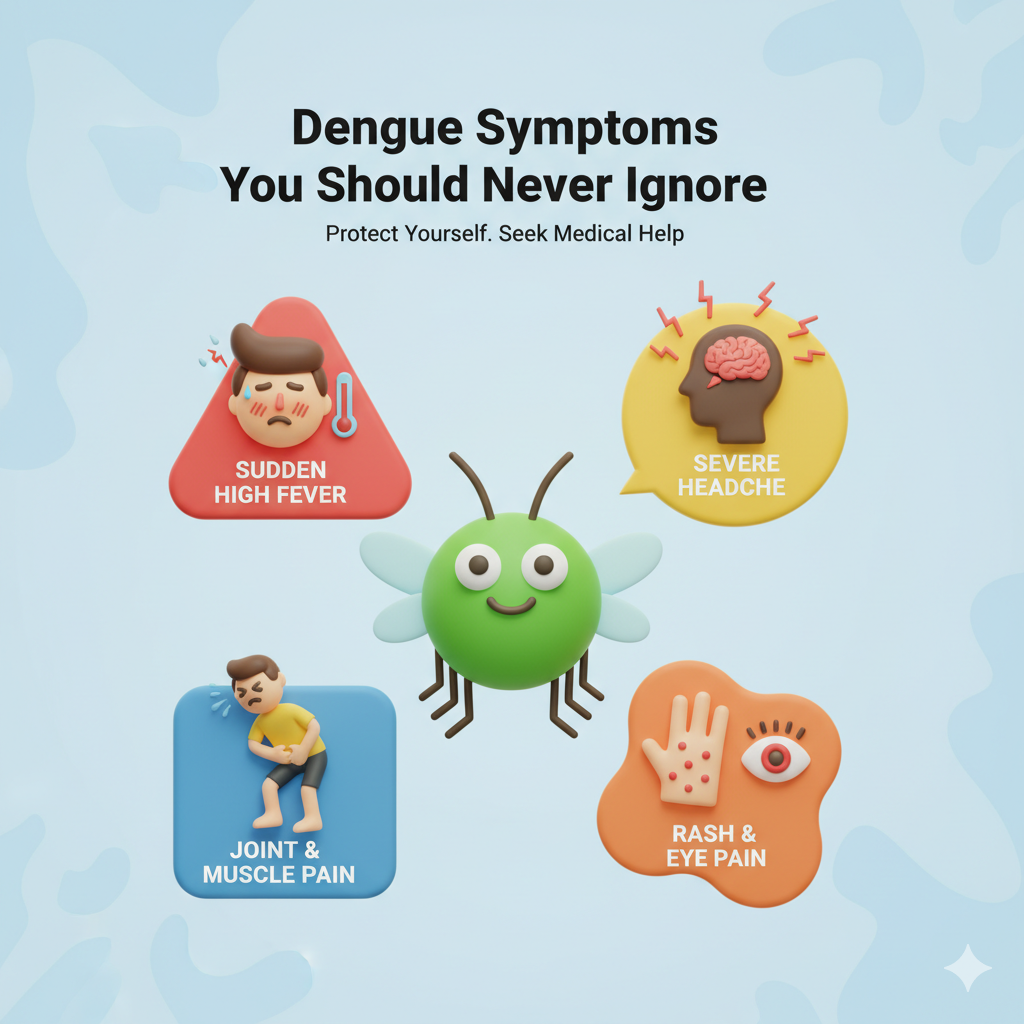
Early-Stage Dengue Symptoms
At first, dengue may feel like a common viral fever. Some early signs include:
- Sudden high fever (often above 102°F)
- Severe headache, especially behind the eyes
- Muscle and joint pain (hence the name breakbone fever)
- Nausea and vomiting
- Skin rashes appearing 2–5 days after fever onset
Since these symptoms overlap with other viral illnesses, it’s important not to assume and instead get a dengue test near me in Delhi as soon as possible.
Severe Dengue Warning Signs
In some cases, dengue progresses into a severe form. Warning signs include:
- Sharp abdominal pain
- Continuous vomiting
- Bleeding gums or nosebleeds
- Blood in stools or vomit
- Sudden drop in platelet count
- Difficulty breathing
Severe dengue requires hospitalization and immediate medical care. Ignoring these symptoms can be life-threatening.
When to Seek Immediate Medical Help
If you or a family member experiences high fever that does not respond to medication, along with any of the warning signs above, it’s crucial to seek medical help immediately. Delhi hospitals often receive late-stage patients, which complicates treatment. By opting for an early dengue test in Delhi, you can avoid reaching this stage.
Importance of Dengue Test Near Me in Delhi
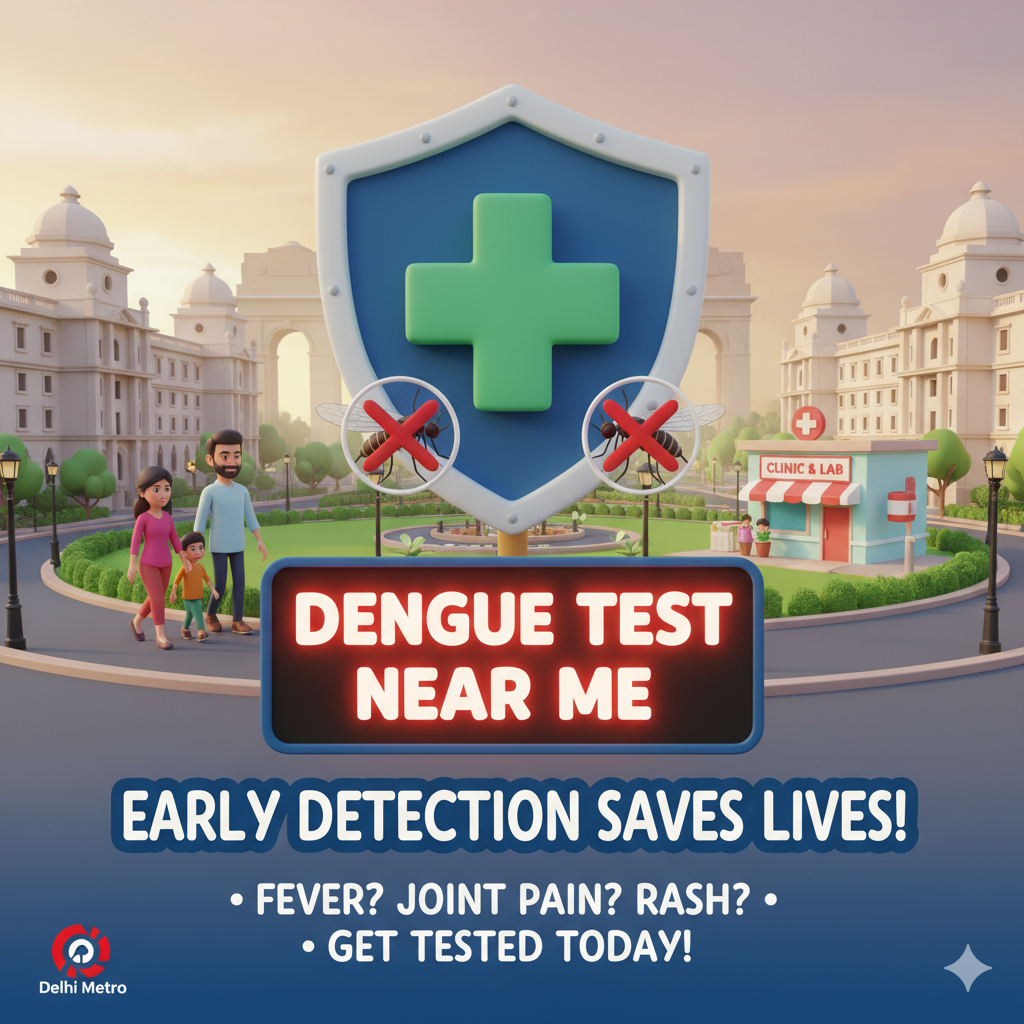
Why Timely Testing Saves Lives
Delhi sees thousands of dengue cases every year, but fatalities can be reduced significantly with early testing. A dengue test confirms the infection within hours, allowing doctors to monitor platelet levels and manage hydration, which are key in dengue recovery.
Who Should Get Tested for Dengue?
- Anyone with unexplained high fever during dengue season
- Individuals living in dengue-prone areas of Delhi
- Children and elderly with weak immunity
- Patients with recurring fever and body pain despite medication
Common Misconceptions About Dengue Tests
Many people believe dengue can be confirmed simply by observing symptoms. This is a dangerous myth. Dengue symptoms mimic malaria, chikungunya, and even flu. Only a lab test can confirm the presence of the dengue virus or its antibodies.
Searching for “dengue test near me in Delhi” is the safest way to ensure correct diagnosis and timely treatment.
Types of Dengue Tests Available in Delhi

NS1 Antigen Test for Dengue
The NS1 antigen test is one of the most common diagnostic tools for early dengue detection. It detects the dengue virus within the first 4–5 days of infection. A positive NS1 test confirms active infection, making it extremely valuable for early-stage patients.
Dengue IgM and IgG Antibody Tests
Antibody tests are performed after the first week of infection. The IgM test indicates a recent infection, while the IgG test shows past exposure to the dengue virus. These tests are useful for understanding whether someone is suffering from a primary or secondary infection, which helps doctors assess risk levels.
PCR Test for Dengue Virus
Polymerase Chain Reaction (PCR) tests provide highly accurate results by detecting the genetic material of the dengue virus. However, they are more expensive and may not be required in all cases.
Rapid Dengue Test Kits vs. Laboratory Tests
Rapid test kits provide quick results within 15–30 minutes. While convenient, they are not as accurate as laboratory-based tests. For confirmation, doctors often recommend a lab-based dengue test.
How to Find Reliable Dengue Test Near Me in Delhi

Factors to Consider When Choosing a Testing Center
When searching for a dengue test near me in Delhi, it’s important not to rush into the first option you find. Not every testing center offers the same level of accuracy, hygiene, and speed in delivering results. Choosing the right one can mean the difference between timely treatment and unnecessary delays.
Key factors to consider include:
- Accuracy and Reliability of Results – The lab should use advanced testing methods like NS1 Antigen or PCR, which are highly reliable. Incorrect results can lead to wrong treatment, so accuracy is non-negotiable.
- Turnaround Time – Dengue requires quick diagnosis. Look for centers that provide same-day or next-day reports.
- Accreditation – A certified and recognized testing center ensures standardized practices. Always check whether the lab follows government-approved guidelines.
- Cleanliness and Safety Protocols – Especially after the COVID-19 pandemic, hygiene standards are more important than ever. The lab should follow proper sterilization and safety measures.
- Location and Accessibility – During dengue fever, traveling long distances can be exhausting. Choosing a nearby lab or one that offers home sample collection is convenient and safer.
Home Collection for Dengue Test in Delhi
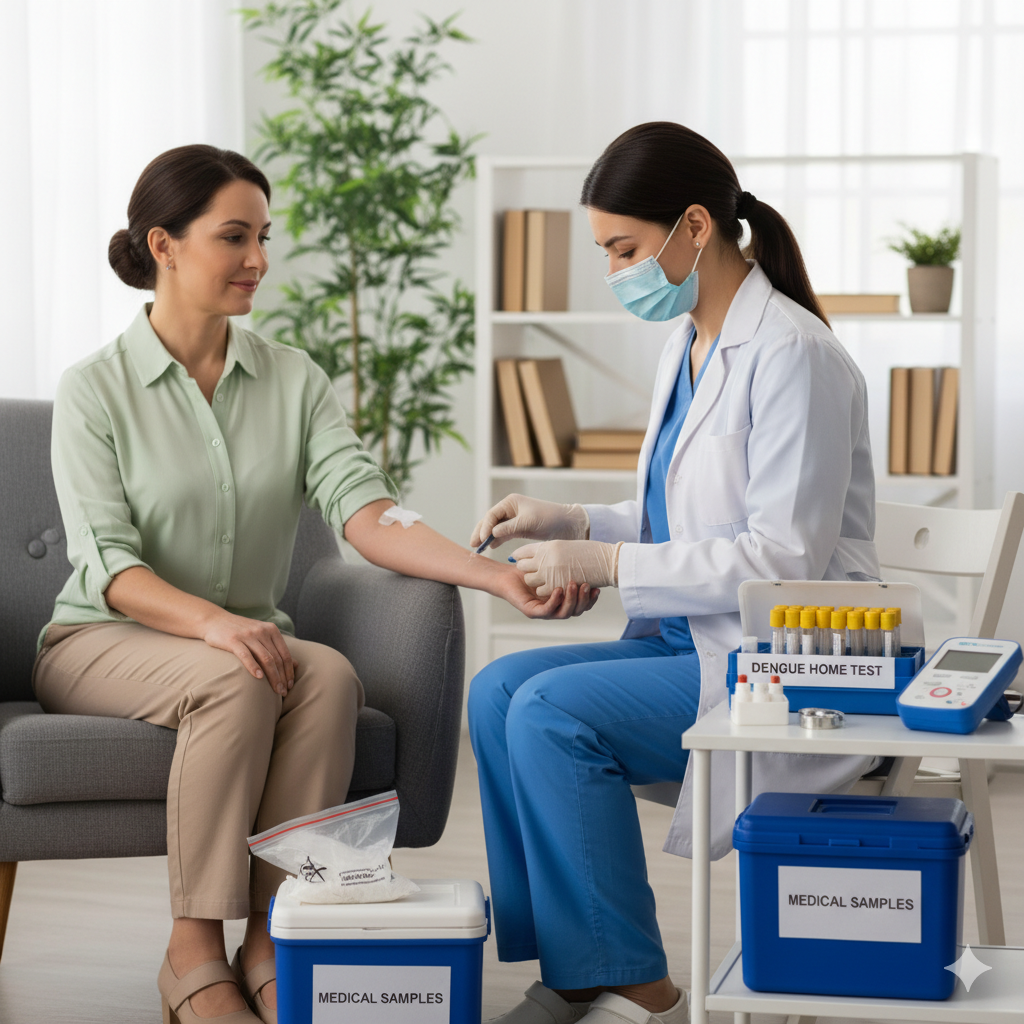
One of the most convenient options today is home sample collection. If you’re feeling weak or don’t want to risk exposure to crowded clinics, you can book a home dengue test in Delhi. Trained professionals visit your home, free home sample collection, and deliver reports online or via email.
Advantages of home collection include:
- Zero travel stress for patients with fever and fatigue
- Reduced risk of spreading infection in public spaces
- Safer for elderly and children
- Easy access for patients living in busy or remote parts of Delhi
Cost of Dengue Test in Delhi
The cost of a dengue test near me in Delhi varies depending on the type of test chosen. On average:
| Type of Dengue Test | Approximate Cost (INR) | Turnaround Time |
| NS1 Antigen Test | ₹600 – ₹1200 | Same Day – 24 hrs |
| IgM & IgG Antibody Test | ₹700 – ₹1500 | 1 – 2 Days |
| PCR Test for Dengue Virus | ₹2000 – ₹4000 | 1 – 3 Days |
| Rapid Dengue Test Kits | ₹300 – ₹800 | 15 – 30 Minutes |
While cost matters, accuracy and speed should be the top priority. Opting for a slightly higher-priced but more reliable test can save you from serious complications later.
Preventive Measures Against Dengue in Delhi
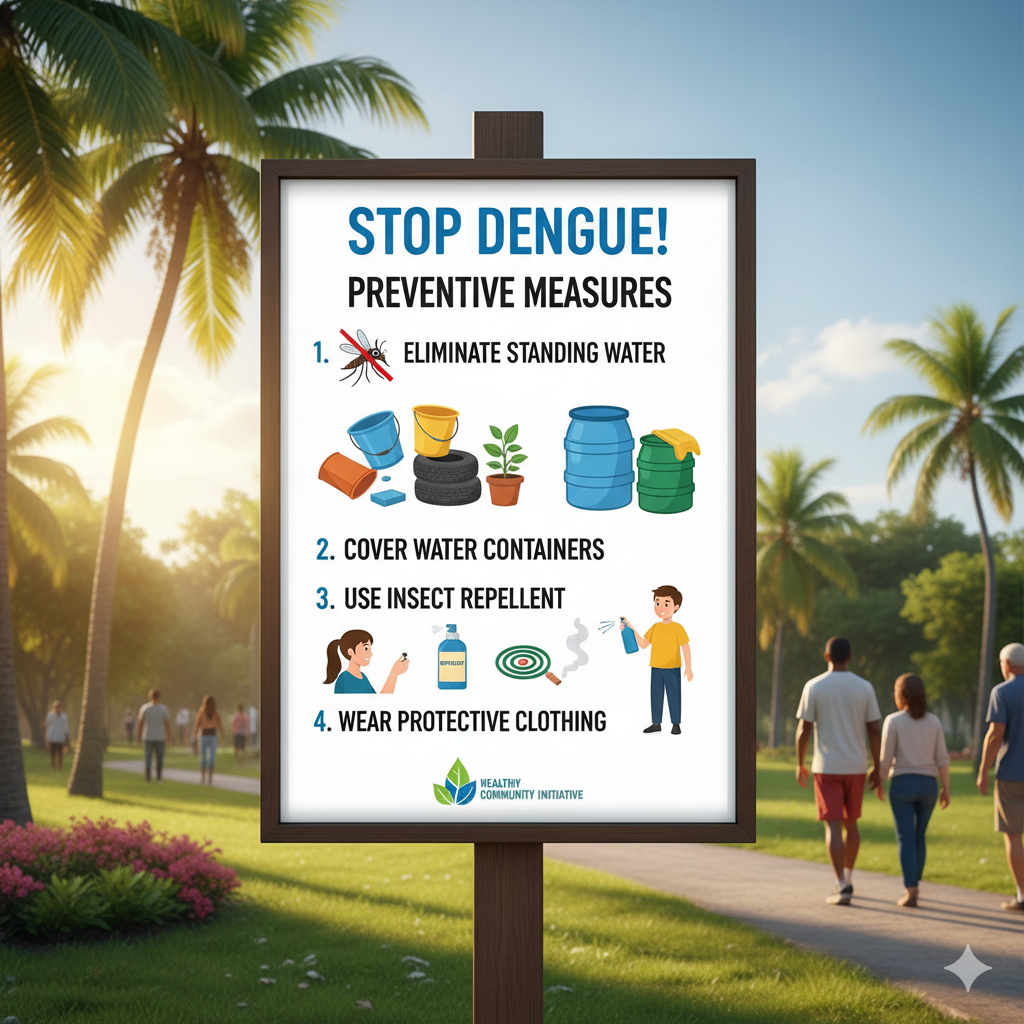
Controlling Mosquito Breeding Sources
The key to fighting dengue lies in eliminating mosquito breeding grounds. The Aedes aegypti mosquito breeds in stagnant water. Unfortunately, urban Delhi provides plenty of such spots—waterlogged roads, uncovered containers, flowerpots, and discarded tires.
Steps you can take at home and in your neighborhood:
- Empty and clean water storage containers weekly
- Cover all water tanks and buckets
- Remove discarded items that can collect rainwater
- Clear clogged drains regularly
- Check coolers and flower vases for standing water
Community participation is crucial. Even if you maintain cleanliness at home, your neighborhood could still be a breeding hotspot. Collective action helps keep the entire area safe.
Personal Protection Against Mosquito Bites
Personal precautions are just as important as community measures. Since dengue mosquitoes bite mostly during the daytime, you need protection round the clock.
- Wear full-sleeved clothes to minimize skin exposure
- Use mosquito repellents on exposed body parts
- Install mosquito nets and window screens at home
- Avoid dark corners where mosquitoes hide
- Use electric mosquito repellents indoors
For children, extra caution is needed because they are more vulnerable to severe dengue. Safe repellents and protective clothing should be used consistently.
Community Participation in Dengue Prevention
Prevention is most effective when communities come together. RWAs (Resident Welfare Associations) in Delhi often organize mosquito-control drives in housing complexes. Local authorities conduct fumigation in dengue-affected areas.
Simple collective actions like weekly cleanliness drives, awareness campaigns, and strict waste management rules can significantly reduce dengue cases in Delhi. Remember: it takes just one infected mosquito to start an outbreak in your locality.
Role of Quick Diagnosis in Dengue Management
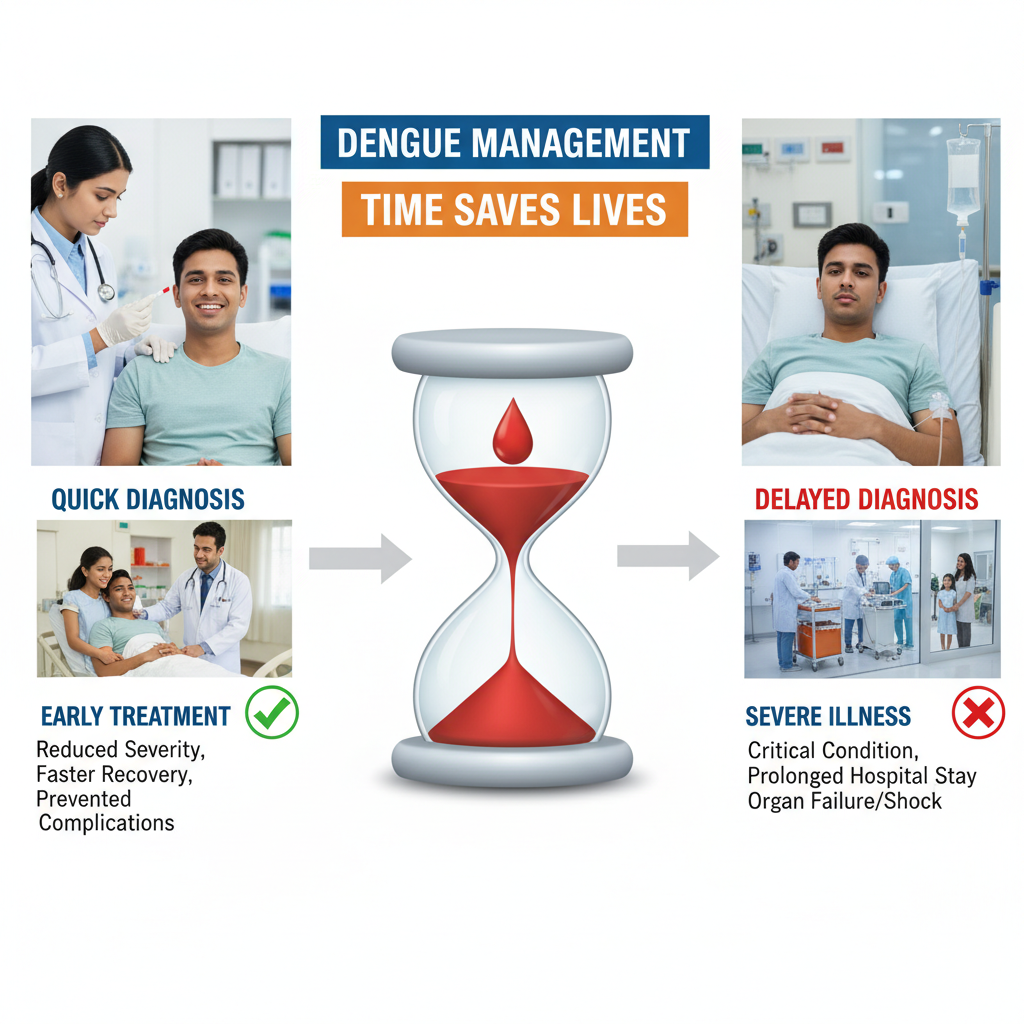
Why Early Detection Matters
Dengue is a fast-progressing disease. In the early stages, it looks like a simple viral fever. But as days pass, platelet counts can drop suddenly, leading to complications.
Quick diagnosis ensures that:
- Patients receive hydration therapy at the right time
- Platelet count monitoring starts early
- Severe dengue cases are identified and hospitalized quickly
- Unnecessary panic and self-medication are avoided
In a city like Delhi, where hospitals often become overcrowded during dengue season, early diagnosis reduces the pressure on emergency care facilities.
Reducing Dengue Fatalities with Timely Care
Studies show that early testing and treatment reduce dengue fatalities drastically. With timely medical attention, most dengue patients recover within two weeks. However, late diagnosis often leads to hospitalization, blood transfusions, and prolonged recovery.
Timely dengue testing in Delhi ensures that even severe cases are handled with efficiency, reducing the risk of deaths.
Avoiding Complications Through Quick Medical Attention
Dengue complications arise mostly due to delays in medical care. Quick testing and early monitoring of symptoms prevent:
- Internal bleeding
- Dengue shock syndrome
- Organ damage
- Extreme platelet loss
For families, especially those with children and elderly members, being proactive about getting a dengue test near me in Delhi can be life-saving.
Dengue Treatment and Care Guidelines
Home Remedies for Mild Dengue Symptoms
If dengue is detected early and symptoms are mild, home care can help in recovery. Some commonly recommended practices include:
- Drinking plenty of fluids to prevent dehydration
- Consuming ORS (Oral Rehydration Solution) for electrolyte balance
- Eating papaya leaf extract (traditionally believed to improve platelet count)
- Having a diet rich in vitamin C, soups, and fresh fruits
- Taking adequate rest
However, it’s important to avoid self-medicating with painkillers like aspirin or ibuprofen, as they may increase the risk of bleeding. Only paracetamol (under medical advice) should be used for fever and pain management.
Hospital Care for Severe Dengue Cases
When dengue progresses to a severe stage, hospitalization becomes essential. Patients are usually monitored for platelet count, blood pressure, and signs of bleeding.
Hospital care includes:
- Intravenous (IV) fluid administration
- Monitoring and maintaining platelet levels
- Managing complications like bleeding or shock
- Oxygen therapy in critical cases
Delhi hospitals are equipped to handle severe dengue, but the problem is overcrowding during peak season. This makes early dengue testing in Delhi all the more important to avoid last-minute emergencies.
Recovery Tips for Dengue Patients
Dengue recovery can take weeks, depending on the severity. Even after fever subsides, patients often feel weak and fatigued. To speed up recovery:
- Take plenty of rest
- Maintain a nutritious diet with green leafy vegetables and fruits
- Avoid strenuous activities for at least 2–3 weeks
- Continue drinking fluids regularly
- Follow up with regular blood tests to monitor platelet levels
Recovery requires patience. Dengue drains the body’s energy, and rushing back to routine life can lead to relapses.
Seasonal Trends of Dengue in Delhi
Why Dengue Peaks During Monsoon
Every year, dengue cases in Delhi rise significantly during the monsoon season. Heavy rainfall combined with poor drainage systems leads to waterlogging in various parts of the city. This stagnant water becomes the perfect breeding ground for Aedes aegypti mosquitoes. Even small collections of water in discarded bottles, old tires, flowerpots, and coolers are enough for mosquitoes to multiply rapidly.
The monsoon season also brings higher humidity levels, which allow mosquitoes to thrive and live longer. More mosquitoes mean more chances of transmission. Unfortunately, most residents tend to lower their guard after the initial rains, ignoring preventive measures like cleaning containers and using mosquito repellents. This negligence results in sudden spikes in dengue cases during July to November.
Government Initiatives During Dengue Season
Every year, the Delhi government launches special drives during monsoon to control dengue. Measures often include:
- Fumigation drives in residential and high-risk areas
- Public awareness campaigns on preventing mosquito breeding
- Door-to-door inspections by health workers to check for stagnant water
- Fine and penalties for households or commercial spaces found with breeding grounds
- Setting up dedicated dengue wards in hospitals to handle patient surges
Despite these efforts, community participation remains the biggest challenge. While the government takes large-scale measures, success depends largely on residents cooperating and following preventive guidelines.
Public Awareness Campaigns for Dengue
Awareness plays a vital role in dengue prevention. Schools, RWAs, NGOs, and social media campaigns spread messages about cleaning water containers, covering tanks, and using protective measures. Slogans like “Sunday 10 o’clock, 10 minutes” encourage people to spend 10 minutes every week checking their homes for mosquito breeding.
Still, awareness alone is not enough. Delhi residents must make dengue prevention a lifestyle habit, not just a seasonal practice.
Myths and Facts About Dengue Testing in Delhi
Can Dengue Be Diagnosed Without a Test?
A common myth is that dengue can be confirmed by symptoms alone. This is false. While dengue does cause unique signs like severe joint pain and skin rashes, these overlap with other illnesses such as malaria, chikungunya, and viral fever. Only a dengue test near me in Delhi can confirm whether the fever is actually dengue or something else.
Is Dengue Always Life-Threatening?
Not all dengue cases are severe. In fact, most people recover with proper hydration and care. The problem arises when patients delay testing and treatment. Severe dengue, also called dengue hemorrhagic fever or dengue shock syndrome, can be fatal if ignored. Early detection through a dengue test drastically reduces risks.
Misunderstandings About Dengue Transmission
Some people wrongly believe dengue spreads through direct human contact or contaminated food. The fact is, dengue spreads only through mosquito bites. If a mosquito bites an infected person and then bites another, the virus spreads. Understanding this helps people focus more on mosquito control instead of unnecessary fears.
Role of Public Health in Controlling Dengue in Delhi
Government Health Guidelines on Dengue Testing
Delhi health authorities regularly issue guidelines on testing and prevention. They recommend that anyone with high fever during dengue season should undergo a test within the first 3–4 days of illness. Hospitals and clinics are instructed to report confirmed cases to the municipal authorities to help track and control outbreaks.
Community Health Programs in Delhi
Various community health programs are launched to spread awareness and provide free or subsidized dengue testing during outbreak seasons. These programs aim to ensure that even low-income families have access to timely diagnosis and treatment.
Importance of Public Participation
While the government plays its part, the role of residents is equally important. Public participation includes:
- Allowing health workers to inspect homes for breeding sources
- Cooperating with fumigation drives
- Educating family members and neighbors about dengue prevention
- Volunteering in community clean-up campaigns
Without active public involvement, government efforts alone cannot stop dengue outbreaks in Delhi.
How to Stay Prepared During Dengue Season in Delhi
Keeping a Dengue Test Near Me Plan Ready
Preparation is the key to timely care. Knowing where to get a dengue test near me in Delhi before falling sick helps avoid panic during emergencies. Families should keep contact numbers of nearby diagnostic centers and hospitals handy.
Stocking Emergency Medicines and Supplies
Households should prepare a dengue emergency kit with:
- ORS (Oral Rehydration Solution) packets
- Paracetamol (only under doctor’s advice)
- Thermometer for monitoring fever
- Mosquito repellents and nets
- Contact list of doctors and testing centers
This preparation ensures immediate action when dengue symptoms strike.
Educating Family Members About Dengue
Awareness within the family is crucial. Children, elderly, and domestic workers should be educated about:
- Identifying dengue symptoms early
- Avoiding self-medication
- Following preventive measures against mosquito bites
- The importance of timely dengue testing in Delhi
A well-informed family can take quick decisions and avoid complications.
Conclusion: Fighting Dengue with Awareness, Prevention & Timely Tests
Dengue remains one of Delhi’s biggest health challenges, particularly during the monsoon and post-monsoon months. While the government and health authorities continue their efforts, the real power to fight dengue lies in awareness, prevention, and timely testing.
If you or someone in your family experiences high fever, body aches, or rashes, don’t wait—search for a dengue test near me in Delhi immediately. Quick diagnosis not only ensures timely treatment but also prevents severe complications.
Remember: prevention starts at home, but victory against dengue requires community effort. By staying alert, prepared, and proactive, we can protect our families and city from this seasonal menace.
FAQs on Dengue Test Near Me in Delhi
1. How long does it take to get dengue test results in Delhi?
Most dengue tests provide results within 24 hours. Rapid tests can give results in 15–30 minutes, while PCR tests may take 2–3 days depending on the lab.
2. What is the most accurate test for dengue fever?
The PCR test is considered the most accurate as it detects the virus directly. However, NS1 Antigen and antibody tests are commonly used due to their availability and affordability.
3. Can I get a dengue test done at home in Delhi?
Yes, many labs in Delhi offer home sample collection for dengue tests. A technician visits your home, collects the blood sample, and sends the results online or via email.
4. What is the normal cost range of a dengue test in Delhi?
The cost ranges from ₹600 to ₹4000 depending on the type of test. NS1 Antigen and antibody tests are more affordable, while PCR tests are relatively expensive.
5. How can I prevent dengue while living in Delhi?
Prevent mosquito breeding around your home, use repellents, wear full-sleeved clothing, and keep water containers covered. Participating in community cleanliness drives also helps reduce risks.

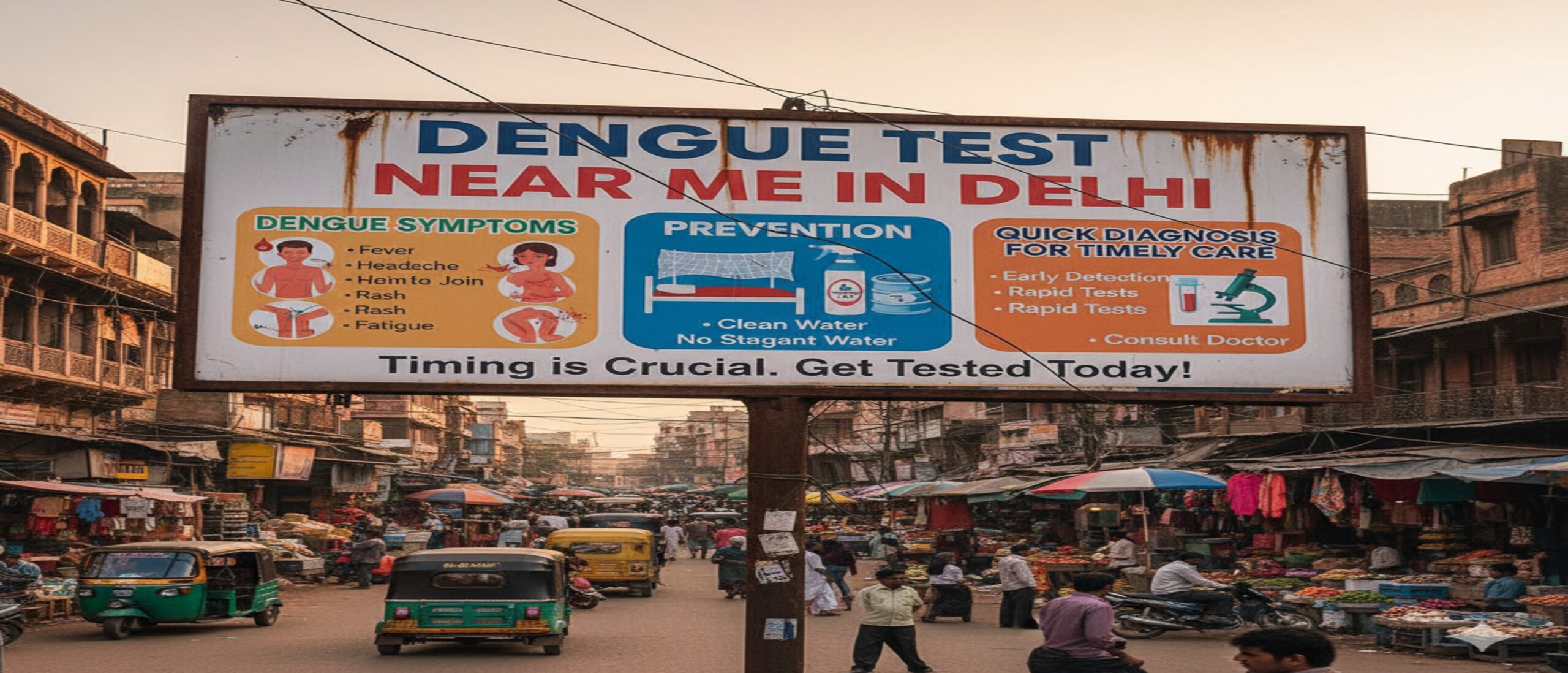
Leave a Reply